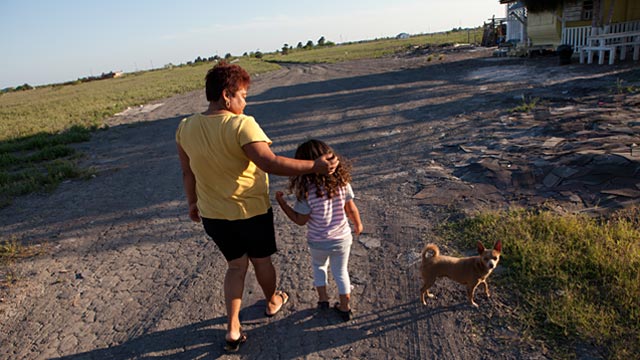
Share On Social!
Health problems plague the half-million people living in colonias in South Texas, U.S. News reports.
Colonias are predominantly Latino, unincorporated, and impoverished areas along the Texas-Mexico border. People live in makeshift shacks or trailers. They lack streets and basic public services, such as running water.
Texas has about 2,300 colonias. 900 are in the Rio Grande Valley, including Hidalgo County. The county is one of the fastest growing counties in Texas, home to the bigger cities of McAllen & Edinburg.
“Ramshackle living conditions [in colonias] have led to a plethora of health concerns,” according to the news report. “About 38,000 colonia residents lacked access to clean drinking water.”
Colonia Health Concerns
Many Latino families lack of support for economic stability, wellness, and education, according to a Salud America! Research Review.

In colonias, these issues reach an extreme level.
The dilapidated living conditions in colonias spark these health concerns:
- Higher risks of developing diabetes
- Mosquito-borne illnesses due to flood zones
- Exposure of toxic pesticides due to farms located nearby
- Lack of healthy food
- Lack of healthcare services
- Children are likely to be obese
One Salud America! grantee found that Latino children in colonias do not meet physical activity requirements. These children are likely to be overweight or obese.
“The built environment influences physical activity among children,” according to the research, and almost all “colonias lack sidewalks, pedestrian signage and parks.”
Positive Changes & Improvements
Changes are happening to address health issues.
La Union Del Pubelo Entero (LUPE) is one of the community advocacy groups that is seeking to make change. In 2015, they successfully pressured the Texas Legislature to install streetlights in colonies and bill residents for lighting.
“We know that (when) advocating for infrastructure issues, that health is a big part of it,” Cristina Leal, LUPE’s health outreach coordinator told U.S. News. “It’s hard for us to walk in the evenings. It’s too dark, our children can’t play outside after school … and the colonias are unsafe.”
Ann Cass is helping in that effort.
Csss runs Proyecto Azteca, a housing development nonprofit in colonias in South Texas.
She learned about the health and physical activity issues in the area from our own research. She now plans sidewalks, trails, and playgrounds for their affordable housing neighborhoods.
More efforts are improving water drainage. Others bring low-cost or free health services to the community.
Working on Wellness is boosting healthy food and exercise options in South Texas.
Some colonias are improving. The number of colonias labeled as “high health risk” has declined. These areas lack drinkable water, wastewater disposal, drainage, and paved roads, according to the article.
“These issues are really prevalent here, but there’s also a new sense of pride around all of the good work that’s happening,” Cindy Salazar-Collier, who leads regional health efforts for the nonprofit It’s Time Texas, told U.S. News. “It is just growing. So it’s really exciting for people like us.”
By The Numbers
25.1
percent
of Latinos remain without health insurance coverage



